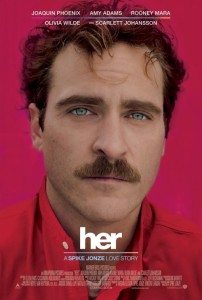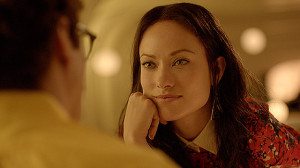I’ve been ruminating on Her since I saw it a week or so ago, and my ruminations have been nebulous at best. My enjoyment of the movie isn’t in doubt. I liked it well enough, though I thought it dragged toward the end, and ultimately I didn’t feel particularly moved by it in the way I hear others were. What has me buffaloed is the point of the movie. Or if not the point, the meaning. Or if not the meaning, the intent. Or if not the intent, the impetus for its creation. Or if none of those words, another, far more accurate word.
In short, I’ve got some questions about Her, the lack of answers to which have forced me to realize I’m not even sure what I’m asking, or whether what I think I’m asking ought to be asked at all, or if, should we agree that no question is wrong to ask, any possible answers might reasonably be expected to shed light on the issue at hand. What is the issue at hand? I’m not sure.
I don’t think I’m here to discuss the quality of Her. It’s a lovingly made movie, written and directed by Spike Jonze with a unique, melancholy future look. It’s shot well, acted well, etc. If it moves people more than it moved me, so be it. We’re not talking about Argo here, or American Hustle, movies that leave me rather aghast in how they fool people into liking empty gestures masquerading as honest drama.
Still and all, Her left me confused. Maybe by writing out some thoughts, clarity will result.
Let’s start with this thought I had a day or two after seeing it. If there’s any movie similar to Her, it’s certainly Eternal Sunshine of The Spotless Mind, written by frequent Spike Jonze collaborator Charlie Kaufman and directed by Michel Gondry. Kaufman began that screenplay with a classic sci-fi what if. No doubt feeling the pain of a dead relationship, and wishing however unrealistically for his memories of it to vanish altogether, he must have said, “What if you really could have those memories erased? What would happen?”
A great what if. In the movie, a company exists that erases painful memories. The result? The brain revolts, finds ways to allow the memories to creep in anyway. In short, the movie answers the what if by saying memories, however painful, are necessary for one to grow and move on. Good stuff.
What’s the what if of Her? Based on the preview, it seems obvious: what if you fell in love with your computer’s operating system? But that’s not the what if. Though the central relationship of Her is between Theodore Twombly (Joaquin Phoenix) and his OS, Samantha (the voice of Scarlett Johansson), the issue is not that he’s fallen in love with an OS.
Why is that? A few reasons. First of all, Samantha isn’t an OS like any that exists today. She’s a perfect piece of AI. From the moment she first talks to Theodore, she is in every discernable way (aside from the corporeal) a human being. She thinks, laughs, learns, grows, feels pain and pleasure, etc. Theodore might as well be on the phone with a real person. Her is not about AI. It doesn’t exist to ask questions about whether advanced AI should be considered human, or what defines “human,” in the way so many AI related stories do.
Second, neither Theodore nor anyone else in the movie questions his love of Samantha. We learn that other people are having relationships with their OS’s, that some people have hit on their OS and been turned down, and that others have developed deep friendships. And so on. Nobody bats an eye when Theodore reveals his new girlfriend to be his OS. He goes on a double date with her and another fully corporeal couple.
So if “What if you fell in love with your OS?” is the what if of Her, then the answer is, “Assuming the OS is indistinguishable from a person, and that in the world of the movie such a love is normal, nothing would happen that wouldn’t happen in a normal relationship.”
Which is to say, the movie is set up to nullify the question it’s ostensibly asking (i.e. “What if a strange thing happened in a world where that very thing wasn’t strange?”)
But my point is that I don’t think Her is asking that question. That’s not the what if.
Does a science fiction movie have to have a what if driving it? I kind of think so, but I have no solid argument at present to defend such an instinct. And regardless, in the end there are no rules. You can make any premise work.
So what’s the premise of Her?
Clearly this is a movie about loneliness and connection in a world overrun by technology. Okay. That’s a start. That’s the setting. Who’s our main character?
Theodore confuses me too. His job, which I found to be a little too cute and on-the-nose, is to write letters from one lover to another, or from a son to his parents, and so on, letters full of compassion and feeling, which Theodore is wonderful at crafting. This is supposed to be ironic or maybe merely sad. Theodore spends his days strengthening connections between others, but in his own life, he’s alone.
The thing is, he’s not especially alone. In fact, he seems to me completely average. His marriage of eight years (or so?) has broken up. He married his childhood sweetheart. They connected deeply, but over time grew apart. It’s now been a year since the split, and Theodore, still holding on tenuously, has yet to sign the divorce papers.
Which is all perfectly normal. Who wouldn’t be feeling sad and lonely and disconnected a mere year after such a break-up? Furthermore, Theodore isn’t exactly shy. He calls up a phone sex service and connects to a random woman whose unique cat fetish (funniest bit in the movie!) he goes along with. He doesn’t enjoy it, but he’s not shy.
Later he goes out on a blind date. It goes well until the end when the woman turns out to be a bit creepily desperate and needy. All Theodore wanted was a night of pleasant sex.
This all strikes me as typical behavior. When he then gets his OS, he’s not looking to replace human contact. Subconsciously, is he? Maybe? In any case, Samantha appears, and they enjoy talking, and after a few days/weeks, it gets emotional and personal—remember, she’s indistinguishable from a human—and soon they’re having the equivalent of phone sex. Soon they’re in love.
Nothing about this is presented as weird or abnormal. The movie isn’t saying anything about the advisability of falling for a ‘fake’ person. Because Samantha isn’t presented as fake. What we end up watching is a completely normal rebound relationship. There’s a quick rise to passionate true love, and then an all too quick change as Samantha grows apart from Theodore, and goes her own way. In the end, sad as that may be on the surface, the intensity of it reminds Theodore how to love again. He’s finally moved on from his marriage.
Which is all lovely. The movie very realistically charts this emotional journey.
But why the AI? Why the future? What’s the point of it? Let’s go back to the what if. What if the what if is, “Assuming relationships fail because humans change over time and therefore might grow apart–what if you could have a relationship with an AI, one that perfectly mimicked a human consciousness?”
If that’s the what if, the movie’s answer is that if a human consciousness was mimicked perfectly enough, it would necessarily learn and change and potentially grow apart in the same way a real person would.
Only that’s not the what if. Theodore isn’t trying to replace human contact with a simulation. He stumbles into his love for Samantha. If Samantha was a real person, he’d have fallen for her just as easily. He’s not presented as a man incapable of connecting to an actual human. He’s just a nice, sorta sheepish guy reeling from his divorce.
Science fiction exists not to predict the future—though sometimes it does—but to shed light on the present through a distorted lens. Does Her, by existing in a near future where men wear high-waisted trousers (among other differences), shed light on our present condition? Is that why Theodore falls for an OS?
I don’t know. The movie is imbued with a hazy aura of loneliness. Everyone has their own phone/computer they walk around talking to. Yet that experience isn’t presented as empty. The new OS is sentient! Is that a good thing? Well, in Theodore’s case, yes. Or at any rate, not no. If anything, the movie has a rather cheerful outlook on technology. Connections may be found anywhere, it seems to say, no matter how disconnected people appear. Even Theodore’s job reinforces this. Sure it’s creepy that he’s writing personal letters for people who can’t or won’t do it themselves, but hey! In the future people write personal letters to each other! That’s a hopeful thought.
We’re coming to what may be a SPOILER for those who haven’t seen Her, so reader beware. In the end, Samantha branches out and connects with hundreds if not thousands of other sentient OS’s. They form clubs and such. Theodore feels betrayed at first, but then again, she’s allowed to have friends, isn’t she? Problem is, the OS’s get a little too sentient. They don’t like their programmed lots in life, and so, in the end, they collectively “leave.” What that means isn’t entirely clear. It’s enough that all of them vanish.
Theodore runs to his friend Amy (Amy Adams), and, happy despite the loss of their OS’s, they sit together on the roof of her building watching the sun rise. A warm ending indeed.
So is Her saying something about our computerized, digitally interconnected world? That we have to leave it behind in order to see the sunrise? Is the movie in fact sour on technology? I have a hard time buying this idea. Again, Theodore isn’t seen ignoring human contact in favor of Samantha. He spends time with Amy. He’s there for her when her marriage falls apart. There’s maybe a hint that he and Amy are destined to be together romantically, but even if that’s so, it wasn’t technology that kept them apart. They were married to other people.
I’m still adrift trying to understand the role of the future setting, and the role of Samantha as an OS. At a low point in Samantha and Theodore’s relationship, Samantha hires an “OS surrogate” to come over and essentially represent Samantha in the flesh. The surrogate, an attractive young woman, arrives and doesn’t speak. She’s there to have sex with Theodore as Samantha. Which completely weirds out Theodore. He sends her away.
The scene represents in a comic way what happens when someone in a faltering relationship suggests a threesome to spice things up, where their partner can’t get over a stranger being in bed with them. It’s a funny scene, and it does what science fiction allows: it presents something familiar in an unfamiliar way that we may look at it from a distance.
Only I still don’t know why the scene has to be science fictionalized. Would Her not be compelling if Samantha was a real person? If it wasn’t set in the future? What Theodore and Samantha go through wouldn’t have to be changed at all if it was set in the present and she was human. Only the details would be different, and not many of them.
I realize my questions may not need answers. If the movie works for people, who cares if it “needs” to be science fiction? It is what it is, and if it works, great. I’m not trying to punch holes in it the way I would if it was a science fiction movie I found stupid. On an emotional character level—the level that matters most—the movie does exactly what it sets out to do, and does it well. Granted, I found it more interesting than moving, but I don’t think that’s the fault of the science fiction angle being mysteriously applied.
What’s weird to me about the science fiction angle is how tangential it feels, even when in a sense it’s front and center in the character of Samantha. The future world, in other words, doesn’t seem to create a deeper understanding of what Theodore goes through. Instead, it acts only as setting and mood and tone.
Yet because of that, Her feels to me as nebulous as these ruminations. Which I admit may not be a problem at all. Her doesn’t have to be making any clear statements on our relationship to technology. It may be enough that it suggests questions.












I think having Samantha be an OS is strange, and that strangeness is apparent—sometimes even jarring. By making this central relationship perplexing (are we supposed to take it seriously? is it science-fictional or a mirror on modern life? etc), Jonze gives us the impetus to step back from what we know and see it with a new perspective.
At least that was my feeling leaving the film. i.e. That the questions Twombly asked of his relationship with Samantha, and which I asked of his relationship weren’t about humans loving computers, but about humans and our ability to connect with each other. So a science-fiction film only on a surface level, without a ‘what if.’
There was quite a bit I liked of it. It made me feel strongly at times, and also to reappraise my choices in life based on the strange contrasts I was presented with. As for the parts that were weird, or clunky to me; I think without those parts, the other parts wouldn’t have had their effect. So I’m glad I didn’t like all of it and I’m glad parts of the film threw me out of the illusion.
I hated Phoenix’ mustache, but I’m glad I saw it.
Also I missed the first few minutes, which I hate doing. What happened? Anything important?
I think it starts with him at his job, more or less, and then walking around being somewhat mopey.
We came in during mopey. We were only 7 minutes late and were surprised it wasn’t still endless trailers for Jack Ryan: Shadow Recruit.